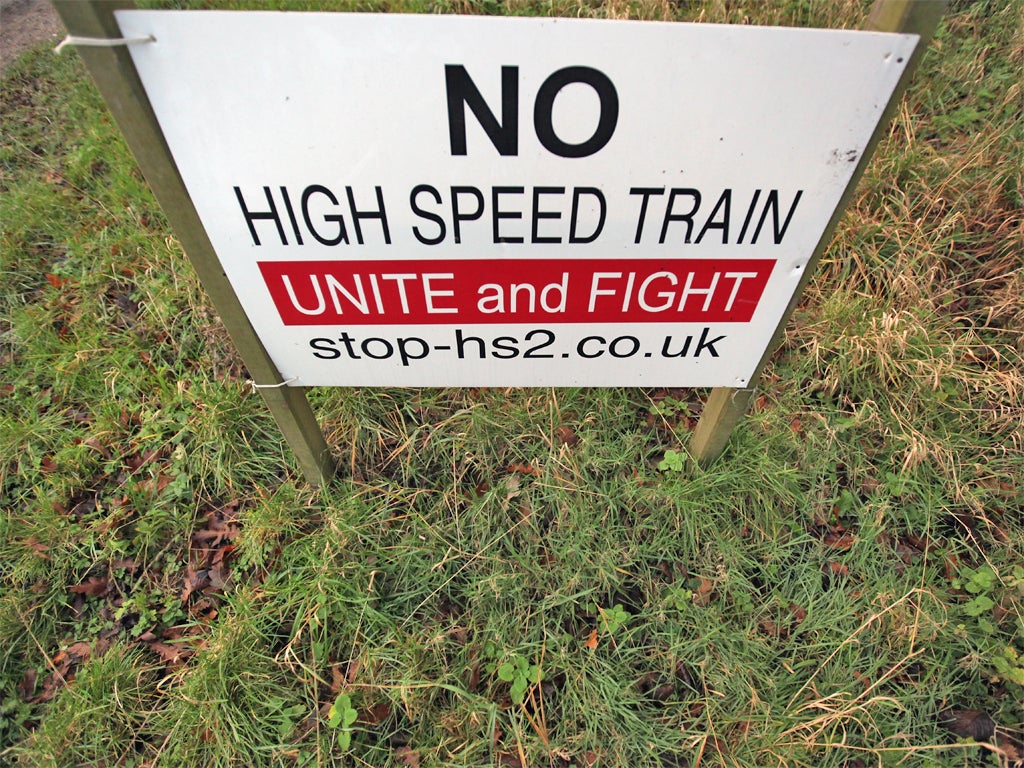Ready to depart: But will the HS2 express be derailed before it arrives?
The Transport Secretary has given the official go-ahead for HS2, the controversial high-speed project that could transform British rail travel. But objectors are still not ready to concede defeat

Your support helps us to tell the story
From reproductive rights to climate change to Big Tech, The Independent is on the ground when the story is developing. Whether it's investigating the financials of Elon Musk's pro-Trump PAC or producing our latest documentary, 'The A Word', which shines a light on the American women fighting for reproductive rights, we know how important it is to parse out the facts from the messaging.
At such a critical moment in US history, we need reporters on the ground. Your donation allows us to keep sending journalists to speak to both sides of the story.
The Independent is trusted by Americans across the entire political spectrum. And unlike many other quality news outlets, we choose not to lock Americans out of our reporting and analysis with paywalls. We believe quality journalism should be available to everyone, paid for by those who can afford it.
Your support makes all the difference.High-speed trains will now run in tunnels and cuttings for more than half of the distance between London and Birmingham, the Transport Secretary announced yesterday as she gave the final go-ahead for the £32.7bn HS2 project after months of delay and opposition.
Click HERE to view graphic
Justine Greening announced a series of changes to the controversial scheme to avert a Tory rebellion and ministerial resignations over the impact of the route on picturesque Home Counties countryside.
But she still faces the prospect of a legal battle before work begins on Britain's biggest railway engineering project since the late 19th century.
Entrenched opposition also remains on the Conservative backbenches, with MPs queuing up to challenge her over the business case for HS2, as well as its huge cost and damage to the landscape.
But Ms Greening insisted the scheme to run trains at 225mph between London and major cities in the Midlands and the North would provide a multi-billion pound boost to the British economy for decades to come.
Under the revised plans for the first 139-mile phase between the capital and Birmingham, 22.5 miles of the 140-mile route will be underground, eight miles more than originally envisaged.
Some of the additional tunnelling will take place in the Buckinghamshire constituency of Chesham and Amersham, represented by Cheryl Gillan, the Welsh Secretary, who had threatened to quit the Cabinet over the plans.
Several other ministers, including the Attorney General Dominic Grieve and the Europe Minister David Lidington, had also come out against the original version of the scheme.
Ms Greening's modifications appear to have headed off the immediate threat of resignations.
Last night Ms Gillan gave a guarded welcome to the moves. She said: "We are still, relative to the timescales for the project, at the beginning of the process. I welcome the further steps that have been taken to mitigate the impact on Chesham and Amersham."
Under the revised plans, 79 miles of the route will run underground or in cuttings, 40 miles on viaducts or embankments and 20 miles near surface level. Most of the route through the Chiltern Hills, designated as an area of outstanding natural beauty, will go through tunnels.
Ms Greening envisages 400 metre-long trains carrying up to 1,100 passengers covering the distance between London and Birmingham in 45 minutes from 2026. The next phase of the Y-shaped network would extend the link to Manchester and Leeds by 2033. The high-speed trains would then transfer to existing tracks to reach cities such as Newcastle, Glasgow and Edinburgh.
Legislation for the first phase of HS2, which is being supported by Labour, will be introduced in Parliament next year. It will run between a rebuilt Euston station and a new station in Birmingham city centre. A connection to HS1, the London to Channel Tunnel high-speed link, will also be constructed.
Opponents last night said they were considering a legal challenge to the scheme. Martin Tett, chairman of the 51m alliance of councils challenging the scheme, said: "This is an immensely bad decision for Britain. At a time of national austerity with rising unemployment and a massive deficit, how can spending more than £32 billion on a rail line be justified? Virtually all objective analysts have condemned this project."
The Countryside Alliance predicted details of court action to block the plans would emerge within days. A spokesman said: "We are not at all happy with the way that this has been consulted upon and generally handled. I'm certain that the people that live along the line are going to fight tooth and nail to stop this happening."
Ms Greening faced sustained criticism from Tory colleagues. Andrea Leadsom, MP for South Northamptonshire, said many of her constituents' communities would be "blighted". Steve Baker, MP for Wycombe, suggested the entire route through the Chilterns should have been underground.
The line in numbers
£16.3bn Budgeted cost of line from London to Birmingham.
£32.7bn Ultimate projected cost, with branches to Leeds and Manchester (by 2032-33).
250mph Top speed of new trains.
49 minutes Reduction in London to Birmingham journey time.
40,000 New jobs expected to be generated by the project.
2026 Scheduled completion date for first stage of project.
£27bn Projected ticket revenues over next 30 years.
400 Houses due to be demolished to make way for HS2 line.
Join our commenting forum
Join thought-provoking conversations, follow other Independent readers and see their replies
Comments